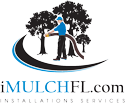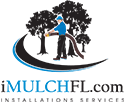Florida Mulch Types
There is a wide variety of wood and bark products available for mulching. Wood and bark have an advantage as they decompose faster, enriching the soil. Primary selection is based on desired appearance and cost. Some can be colored to match the paint color of the home or landscape features.
Cypress Mulch
Cypress mulch is an organic material used in landscaping and gardening. All organic mulches help soil retain moisture, keep the soil cool and insulate plant roots during freezing temperatures. Most mulches also prevent the growth of weeds and provide a nice finished look to the yard or garden. In addition to these properties, cypress mulch offers several benefits that other mulches do not.
Colored Mulch
Mulch can be synthetically dyed in various color options such as; red mulch, brown mulch, gold mulch or black mulch. Mulch is produced from hardwood forest scraps, small tree stems, or in some cases, from recycled shredded waste wood. The dye is used to produce the bright red color, which looks attractive when new. Red mulch provides a nice contrast to green landscapes, hinders the growth of troublesome weeds, and helps maintain moisture around Florida landscapes. Brown dyed mulch is a dyed shredded oak bark. Brown dyed mulch is somewhat thicker and is a chocolate brown color. This color lasts the longest of all the mulches. Some break-up this mulch mid-way through the season, while others have no problem leaving it alone. Black dyed mulch soaks up the sunlight more than other colors because of its deep dark color. This then helps with keeping the soil warm, so your plants grow healthier and faster.
Pine Bark Mulch
Pine bark mulch is from shredded pine trees. Most of the pine bark mulch comes from tree logs. Pine bark mulch comes in shades of golden brown, red, and brown. The color depends on where the pine trees are located. Pine bark mulch is a very light weight mulch. Pine bark mulch can help maintain moisture around plants, but needs to be a few inches deep.
Florida Mulch Types (click to expand)
Wood or bark mulch is great around trees, shrubs, perennials, and small fruits. A wood/bark mulch creates a favorable environment for earthworms and soil microorganisms. Over time, this helps reduce soil compaction.
In perennial and shrub beds, wood/bark chips can reduce the need for irrigation by as much as 50%. Mulching materials that mesh together are more effective at reducing water evaporation from the soil. Under acute water restrictions, gardeners with wood/bark mulch have been incorrectly accused of illegally irrigating because their plants are still faring well, compared to the neighbors!
Wood/bark mulch is not recommended in vegetable or annual flowerbeds where the soil is routinely cultivated to prepare a seedbed.
When applied correctly, mulch has the following beneficial effects on plants and soil:


